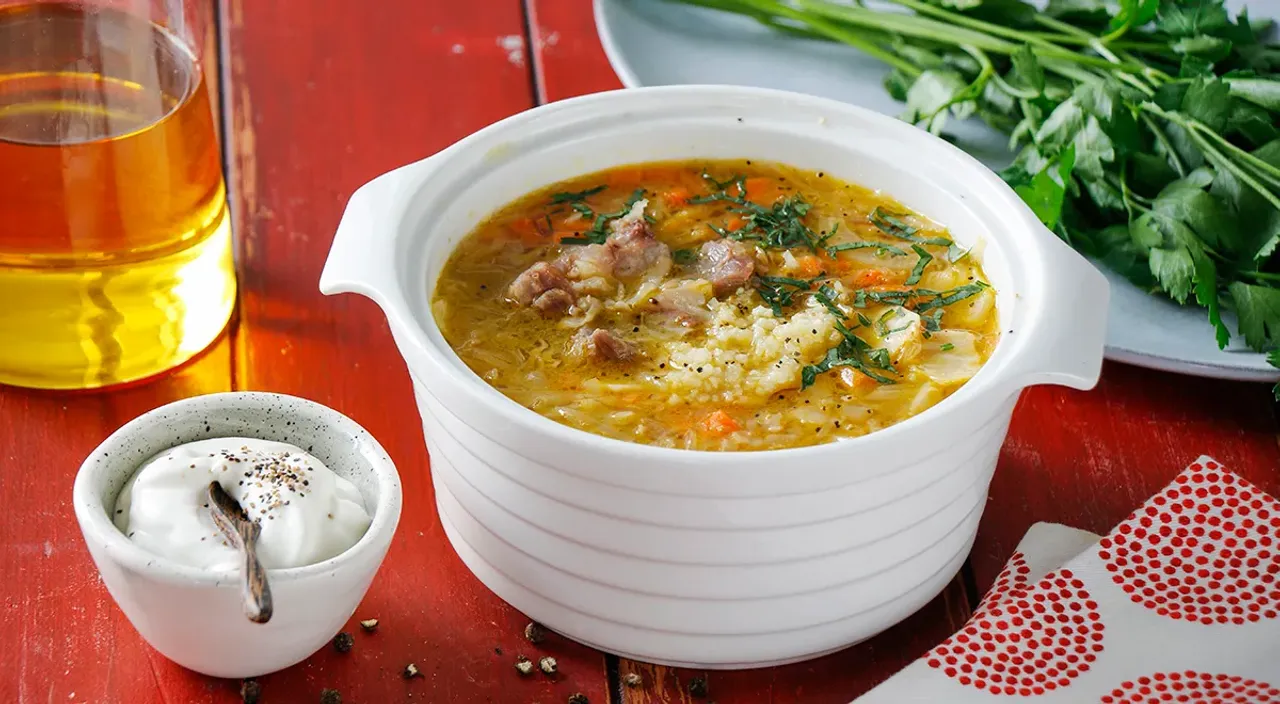
Prep Time
24 h.
Cooking Time
8 h.
Serves
4
Difficulty
Don't want to rewrite the link? Scan the QR code with your camera and go to this page!
On iOS, you can use the built-in camera; on Android, you need to download an application to scan QR codes.
About This Recipe
Daily cabbage soup, an ancient Russian dish, is a gem of Russian cuisine. Those who mockingly chuckled likely adhere to the saying "we don't eat cabbage soup with a bast shoe," thinking that cabbage soup symbolizes something simple and impoverished. However, true daily cabbage soup is a celebration and a marvel. Why is it called daily cabbage soup? Some housewives, after cooking regular cabbage soup, leave it in the room for a day and boast, "I have daily cabbage soup." This is a misconception. It is much more complex. In Russia, cabbage soup made from sauerkraut was cooked for almost a day: it simmered for a long time in the oven and then matured in complete silence—no shaking the floor or disturbing the air. Children would get stern reprimands for laughing and running around. The next day, the soup could be eaten. Another unique aspect is freezing cabbage soup. This was done in winter initially just for preservation. It was convenient: step into the hallway, chip a piece from the pot, heat it up, eat it—you feel good both in body and spirit. This freezing method was particularly useful for coachmen during winter travels. They carried a semi-finished product—a mixture of sauerkraut and onions that had simmered for a long time and was then frozen. Upon arriving at an inn, the coachman would pour boiling water over the mixture, add dried meat, and end up with hearty coachman’s cabbage soup. Incidentally, it turned out that freezing only made the soup tastier—sweeter and richer. In our slightly simplified recipe version, we tried to stay close to tradition. Whether to freeze the soup or not is up to the housewife. However, it is better to prepare the pots. Ideally, they should have a capacity of 500 ml.
Ingredients List
Total Ingredients: 13
Serves:
Pork knuckle with skin - 700 g
Sauerkraut - 500 g
Carrot - 150 g
Parsley or parsnip root - 100 g
Onion - 120 g
Vegetable or ghee oil for frying - 40 g
Dill seeds - 1 tsp.
Bay leaf - 3 pcs.
Black peppercorns - to taste
Garlic - 4 clove
Salt - to taste
Sour cream - 80 g
parsley - to taste
Nutrition Facts
Serves:
🥓
Fat
246г
🍚
Carbohydrates
197г
🥩
Proteins
180г
🔥
Kcal
Daily Values
Preparation Steps
Step 1
Pour two liters of water over the pork knuckle or other meat with bones, bring to a boil, add salt, skim off the foam and simmer the broth over low heat for 1.5–2 hours, adding peppercorns and bay leaves in the process.
Step 2
While the broth is cooking, make the poaching. Cut the onion into small cubes, chop the sauerkraut into pieces that are easy to eat - we don’t need long ribbons in the soup.
Step 3
Heat a frying pan with half the ghee and fry the onion over medium heat for 3-4 minutes until golden brown. Add sauerkraut to the pan and simmer for 20 minutes, stirring.
Step 4
Place the cabbage in a small baking dish, season with dill seeds, pour in a ladle of broth from the pan in which the meat is cooked, and place the dish in an oven preheated to 100–120ºC for a couple of hours.
Step 5
When the sauerkraut poach turns a reddish-brown color in the oven and is soft enough, remove the pan. At this stage, there is an option - cool the weld and freeze it for a day. But this is for those who are especially patient. The rest can act according to a simplified plan.
Step 6
Peel the carrots and parsley. Cut the carrots into strips or small cubes, and the parsley root into circles. Heat the remaining ghee in a frying pan and fry the root vegetables for 5 minutes.
Step 7
Strain the finished broth, remove the meat from the bones - ideally it should separate easily - and cut into pieces. Place the meat in a separate bowl. The bones will no longer be needed.
Step 8
Prepare 4 500 ml pots. Place pieces of meat, sauerkraut and roasted carrots and parsley into pots. Fill everything with broth almost to the brim.
Step 9
Cover the pots with lids and place in the oven to simmer at 100ºC for 3-4 hours. From time to time it is worth checking the pots and adding broth or boiling water if necessary.
Step 10
About 10 minutes before the end of simmering the cabbage soup, grind the garlic cloves and add to each pot. Remove the pots from the oven. In general, cabbage soup can be considered ready. Unless, of course, you want to freeze them and then thaw them again. Serve in pots with sour cream and fresh parsley.
Enjoy your meal!
Follow the instructions step by step
